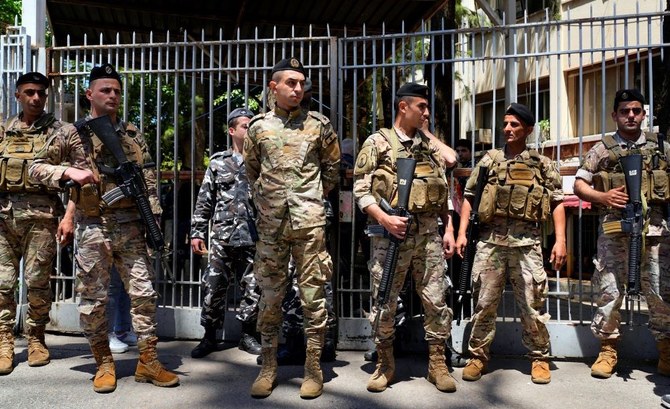BEIRUT: Raja Salameh, the brother of Lebanon’s central bank governor, on Thursday appeared before a team of European judges investigating financial crimes and international money laundering involving more than $330 million.
The judicial delegation, headed by French judge Aude Buresi, heard Salameh’s testimony at the Beirut Palace of Justice as part of investigations by European countries into financial transfers outside Lebanon and transactions conducted by Forry Associates, which Salameh owns.
Salameh had failed to attend two sessions last week due to health problems, according to a medical report submitted by his representative to the European delegation.
Salameh’s legal representative did not attend Thursday’s session, saying that his client was “a witness, not a suspect.”
According to a judicial source, the session lasted six hours, with European investigators asking 140 questions, prompting an agitated Salameh to complain about the length of the hearing.
Under Lebanese law, the European judges cannot directly question Salameh, but must seek answers through a Lebanese judge and mediator. The delegation cannot take any decision to charge or make an arrest on Lebanese territory.
At least three countries, France, Germany and Luxembourg, are investigating Riad Salameh, the Banque du Liban governor, and his brother Raja for allegedly embezzling more than $330 million from the bank between 2002 and 2015.
Judge Buresi is due to question Riad Salameh in Paris on May 16, but the bank chief’s appearance before the French judiciary remains uncertain.
European investigators have heard the testimonies of several people, including bank managers and central bank employees.
They also questioned the governor’s assistant Marianne Hoayek and financial auditors again this week. The delegation is scheduled to question caretaker Finance Minister Youssef Khalil on Friday and will leave Lebanon that night.
In 2022, the Lebanese judiciary opened a local investigation into Salameh after European investigators questioned him over alleged involvement in embezzlement cases.
The Beirut Public Prosecution charged the Salameh brothers and Hoayek with “embezzlement of public funds, forgery, illicit enrichment, money laundering and tax evasion.”
The Lebanese state, represented by Judge Helena Iskandar, head of the Cases Authority of the Ministry of Justice, filed charges against the three, demanding their arrest, seizure of their properties and bank accounts, and for accounts belonging to their spouses and children in Lebanon and abroad to be frozen.
The first investigating judge in Beirut, Charbel Bou Samra, set May 18 as a date for the hearing with Salameh as a defendant in the local case, separately from the European case.
The local investigation will be confidential.
A travel ban was issued against the Salameh brothers, but the governor is still in the position he has occupied since 1993, and his term is scheduled to expire at the end of this month.
In February, Salameh responded to the accusations, insisting he was innocent.
In conjunction with the European investigations, the disciplinary board unanimously decided to dismiss Mount Lebanon public prosecutor Judge Ghada Aoun from the judiciary.
The decision was based on claims of legal violations presented against Aoun before the judicial inquiry.
Following the decision, Aoun said: “They are pursuing the only judge who dares to investigate such cases. I did not invent anything and I have evidence, and they are prosecuting me because I am doing my job. I fear no one, even if they want to kill me.”
Aoun has appealed against the dismissal, but the Supreme Judicial Council is not bound by a deadline to decide on this appeal. Meanwhile, Aoun is unable to continue her work, and is expected to retire in two and a half years.
Aoun had pursued the BDL governor, as well as at least six Lebanese banks and a money transfer company, on charges of money laundering and fraud, based on claims by activists.
Banks in Lebanon have been on strike since February in protest against a judicial summons issued by Aoun and her request for an end to anonymity for banking officials.
The banks argued that “Aoun’s actions were affecting the financial reputation of the Lebanese banking sector abroad, especially with correspondent banks, for reasons related to internal political disputes.”
























